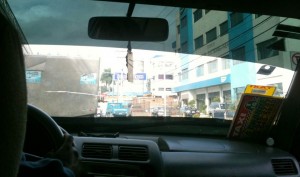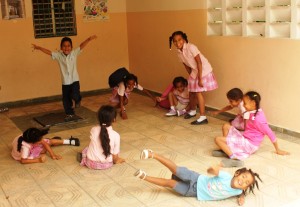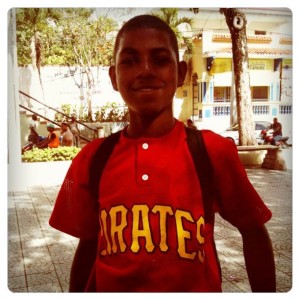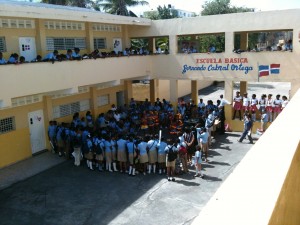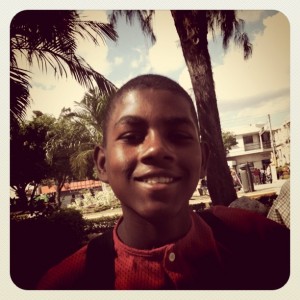Aaron Roth – HOPE International – “Save a Dollar” – June 2012
Hi everyone, this newsletter is about June and the HOPE International savings groups in Comas, Peru, and the July newsletter will be about the Esperanza-Edify family camp we had in Colegio Bethesda in La Romana, Dominican Republic. On another note, although my final date was to be August, I’m planning on staying to early October to help with an annual HOPE event here in the DR. Do please continue to support me if you feel led. More on my Fall departure will come in the next newsletters, and on my blog.
- Download this email as a pdf: Aaron Roth – June 2012 Update.pdf
- Blog and Support Page: www.AaronRoth.net
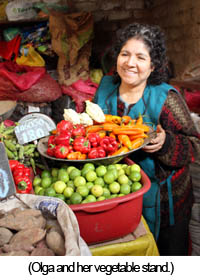
- HOPE International Worldwide – www.HOPEinternational.org
- Newsletter Archive: AaronRoth.net – Monthly Newsletters
“I didn’t know how to save my money, but now I do.” is what Olga, 52 years old, member of the “Good Seed” savings group in Comas, Peru told me. Have you ever said that to someone? (Or do you know how to save?) Has your budget ever come up short during a month? Have you ever wanted to buy something but felt that it was just out of your reach? These are the questions that I use daily when talking with people about their money and their hopes and dreams for the future. In Olga’s case, she has been excited about putting away $2-3 a week, something she’s never done before in her life, and is amazed to see her stock pile grow which she will use to make inventory purchases in the future.
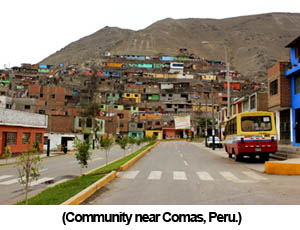 Last month, I had the opportunity to go work in Lima, Peru for six days during June 20-26 to help a volunteer from HOPE, Cindy Kalinoski, www.thewordhelper.com, do a series of interviews of the savings group members, the program team, and the local church that was implementing the project.
Last month, I had the opportunity to go work in Lima, Peru for six days during June 20-26 to help a volunteer from HOPE, Cindy Kalinoski, www.thewordhelper.com, do a series of interviews of the savings group members, the program team, and the local church that was implementing the project.
As a translator, it was my job to schedule the trips to the local market and facilitate the interviews while Cindy carried out the content of each meeting. Our work took us through three local markets of three districts of North Lima. Lima, Peru has a population of nearly 30 million people, and roughly nine million of those live in the capital in one of 36 districts. It was interesting and very enjoyable to be in another Latin American country that spoke Spanish, but instead of sea-level plains and Carribean plants, I was surrounded by mountains and the noise and hustle and bustle of the city.
In North Lima, our home base was a district called Comas where HOPE International has a partnership with the local church Iglesia Alianza Cristiana y Misionera de Comas (www.acymcomas.org) to carry out a savings group program. Members of the group make weekly savings deposits when they meet in small groups of their local 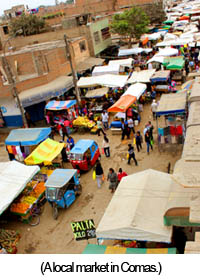 congregation, and the groups save their funds together as a form of accountability and support. This similar savings model is what HOPE savings programs look like in Rwanda where we have more than 100,000 members with a partnership Urewego Bank (www.uomb.org), and in the Philippines where we have more than 200,000 members with a partnership with CCT (http://cct.org.ph).
congregation, and the groups save their funds together as a form of accountability and support. This similar savings model is what HOPE savings programs look like in Rwanda where we have more than 100,000 members with a partnership Urewego Bank (www.uomb.org), and in the Philippines where we have more than 200,000 members with a partnership with CCT (http://cct.org.ph).
In speaking with Pastor Angel Barriento, senior pastor of the Comas church, he relayed to us the state of the local economy: “Most of the local commerce in the area can be classified as “informal” meaning that the people are out in the streets and in the markets selling goods, instead of office buildings and corporate parks like you all might be used to. For those at the bottom of the social class pyramid, there are relatively few or no options to have banking services or basic savings programs.”
The Comas church has been excited about this project because by offering this savings tool coupled with a financial ministry they are able to reach people they would never be able to meet by traditional methods. A basic strategy of finding new clients is to walk around through the markets (pictured 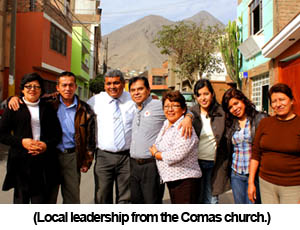 right) and ask them where they do their banking and where they go to church. A member of the leadership team can then invite them to church and to the savings groups they are promoting. Simple and effective.
right) and ask them where they do their banking and where they go to church. A member of the leadership team can then invite them to church and to the savings groups they are promoting. Simple and effective.
In Comas, Peru, in South and Central America, and indeed here in the Dominican Republic, you’ll see in most economically poor areas that there is a basic lack of financial services: checking accounts, savings accounts, and reasonable rates for loans. In America, we don’t even think twice about not having access to these services. With advertisements on our local streets or arriving in the mail, we are inundated with offers.
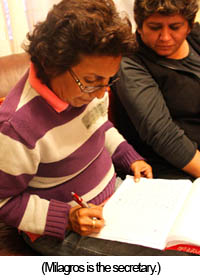 But in talking with the members of these seven savings groups in Peru, getting a savings account is pretty tough with the account requirements, distance to local banks, and the limited service hours. This is why HOPE promotes savings groups, and their specific strategy is managing these programs through an established community like a church.
But in talking with the members of these seven savings groups in Peru, getting a savings account is pretty tough with the account requirements, distance to local banks, and the limited service hours. This is why HOPE promotes savings groups, and their specific strategy is managing these programs through an established community like a church.
I believe now more than ever that in order to have overseas development work well, we have to partner with local leaders. I was overjoyed to meet Pastor Roberto Peche and his family (pictured above wearing a tie with the leadership team). He’s in charge of the men’s ministry for the church and the financial ministry with the savings groups. He has such a passion for teaching and discipleship and this program allows him to go out into the communities to give them financial tools and training to prosper in their businesses.
Take for example the case of Milagros (pictured right.) She joined this savings group from the church about 10 months ago, when Pastor Roberto and his team came through the market where she was working. Through the savings group she learned how to manage her money, create her own budget, make plans for a future business, and was given a position of leadership and responsibility as the secretary of the group. What’s most exciting is that recently, when the group was mature and built up its savings funds, the group gave Milagros a loan for $75. With that $75 dollars she was able to buy more inventory for her store.
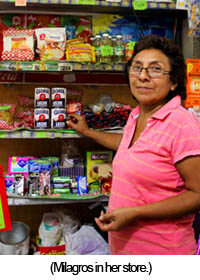 I love this idea that this business that you see in the left picture did not exist 3 months ago, but with this loan from her savings group, a community of her friends, she was able to fulfill a lifelong dream – owning her own store. This store provides the necessary income for her and her three children, and since it is the only one in the local neighborhood she is helping her community have better access to needed goods.
I love this idea that this business that you see in the left picture did not exist 3 months ago, but with this loan from her savings group, a community of her friends, she was able to fulfill a lifelong dream – owning her own store. This store provides the necessary income for her and her three children, and since it is the only one in the local neighborhood she is helping her community have better access to needed goods.
For us, maybe the idea of saving a few dollars isn’t anything special, but if you were to put yourself in the shoes of someone like Milagros or Olga, people who have no easy access to financial services, saving money was hard. But now, even these few dollars can make a big difference in their lives. They began trusting in the promise of savings, the promise of the solidarity and community that they find in their group, and a new hope in the truth they are finding in the church community, as many of the women in the group were not active church goers in the past.
I think so often that for us, we put so much stock in what we make, or what we are able to earn and buy. It can represent the value we have for ourselves and what we show our friends and family. We can get lost in what the role and the utility of money should be, and make it something more important than it is. By talking with these members of the savings groups, I see the value in appreciating money in the right way and by trusting in the promise of the Bible.
“Command those who are rich in this present world not to be arrogant nor to put their hope in wealth, which is so uncertain, but to put their hope in God, who richly provides us with everything for our enjoyment. Command them to do good, to be rich in good deeds, and to be generous and willing to share. In this way they will lay up treasure for themselves as a firm foundation for the coming age, so that they may take hold of the life that is truly life.” (1 Timothy 6:17-19 NIV)
I pray that you would see the value in saving your money to save for the good purchases in life, and that stockpiling or making money would not distract you from what is really important.
Blessings to you and your family,
-Aaron

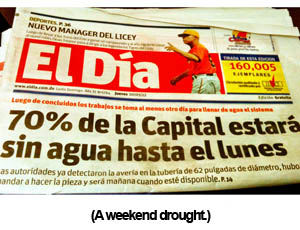
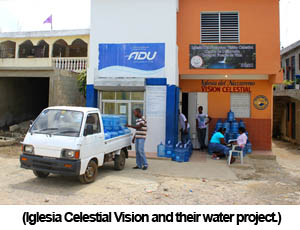
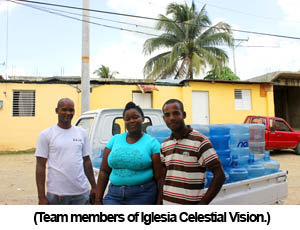
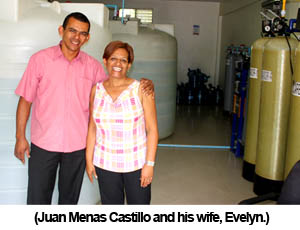
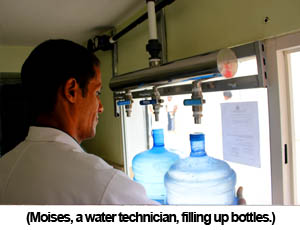
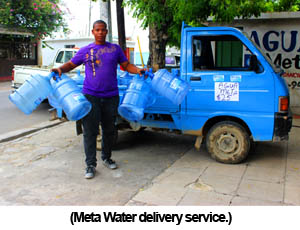
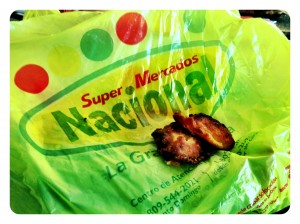
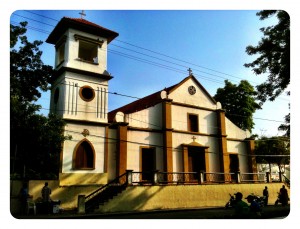

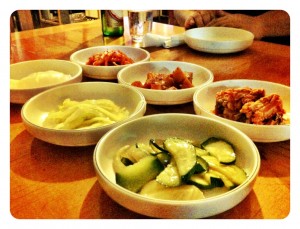

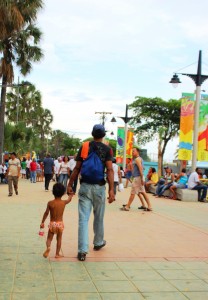
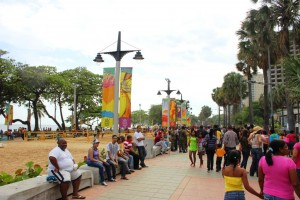
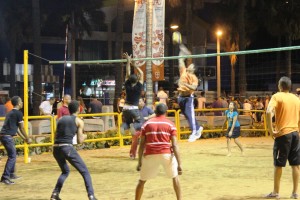
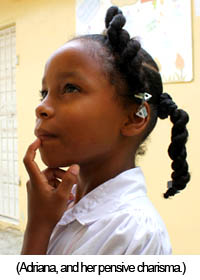
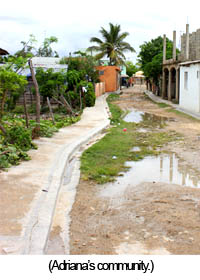 While sitting in the office with the director, I noticed a young girl peeking her head around the corner, smiling and going back to her work. I’m not sure if she was in trouble and she was being disciplined by having to sit so close to the office, but I thought I would go and investigate. As part of my responsibilities with the program, I go and work with the school administration to develop a “school profile” which entails basic school information like classrooms and number of teachers, to more in-depth information like financial situation, Christian education, and future expansion plans.
While sitting in the office with the director, I noticed a young girl peeking her head around the corner, smiling and going back to her work. I’m not sure if she was in trouble and she was being disciplined by having to sit so close to the office, but I thought I would go and investigate. As part of my responsibilities with the program, I go and work with the school administration to develop a “school profile” which entails basic school information like classrooms and number of teachers, to more in-depth information like financial situation, Christian education, and future expansion plans.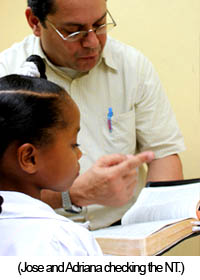 Within a few minutes of small talk, it’s clear that Adriana doesn’t believe my name’s lineage can be traced to the brother of Moses, so Jose, part of our team, goes and fetches a Bible. He flips to Numbers, and in chapter 20, we find my name displayed in the title of verse 22. “But Aaron is dead!!!” she exclaims. I am quick to point out, that “this” Aaron is still alive. She laughs, I laugh, Jose laughs. Jose adds that his name is also found in the New Testament, and just like I told you earlier, she doesn’t believe him either. But as they study the genealogy of Jesus, she yells her new discovery, “But you’re the father of Jesus!!!”
Within a few minutes of small talk, it’s clear that Adriana doesn’t believe my name’s lineage can be traced to the brother of Moses, so Jose, part of our team, goes and fetches a Bible. He flips to Numbers, and in chapter 20, we find my name displayed in the title of verse 22. “But Aaron is dead!!!” she exclaims. I am quick to point out, that “this” Aaron is still alive. She laughs, I laugh, Jose laughs. Jose adds that his name is also found in the New Testament, and just like I told you earlier, she doesn’t believe him either. But as they study the genealogy of Jesus, she yells her new discovery, “But you’re the father of Jesus!!!”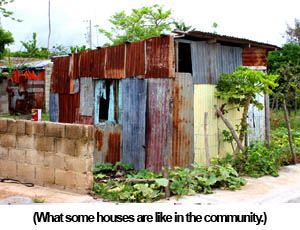 much of the houses have walls and roofs of sheet metal, and in fact, this particular community is called “Death Beach.”
much of the houses have walls and roofs of sheet metal, and in fact, this particular community is called “Death Beach.”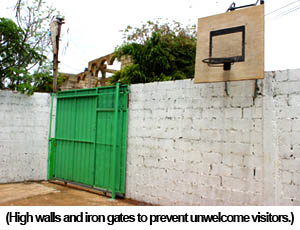 When I asked him to elaborate he says, “When a young girl doesn’t have money to pay the bus driver to go into town for work or school, he simply tells her, ‘You can pay me in different ways . . .’”
When I asked him to elaborate he says, “When a young girl doesn’t have money to pay the bus driver to go into town for work or school, he simply tells her, ‘You can pay me in different ways . . .’”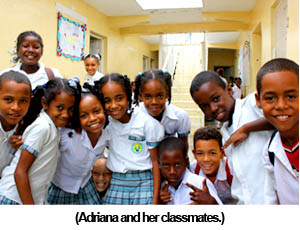 She and 20 other children wave goodbye as we drive away. To be honest with you, those hard questions are ones we wrestle with everyday, and we do have the opportunity to answer them with HOPE International and their on-the-ground partner Esperanza and Edify, and we are making real and tangible efforts in communities like this one.
She and 20 other children wave goodbye as we drive away. To be honest with you, those hard questions are ones we wrestle with everyday, and we do have the opportunity to answer them with HOPE International and their on-the-ground partner Esperanza and Edify, and we are making real and tangible efforts in communities like this one.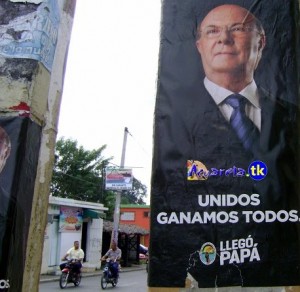
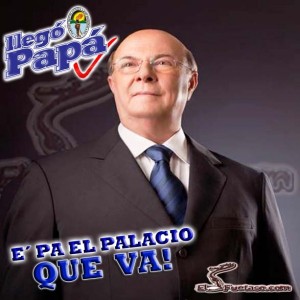
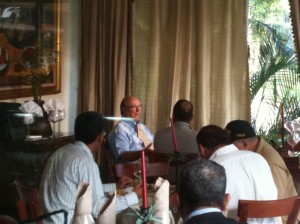
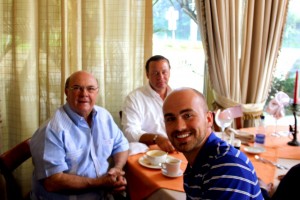
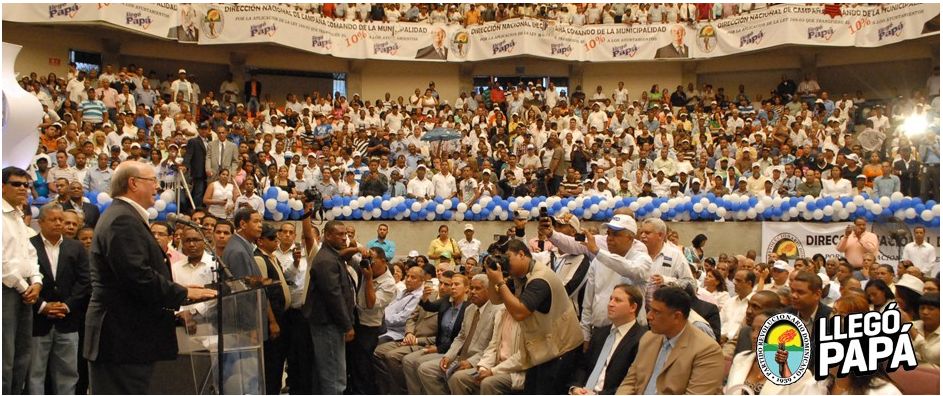
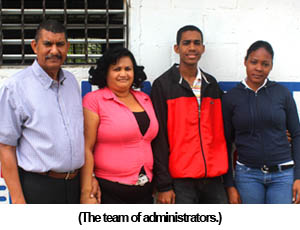
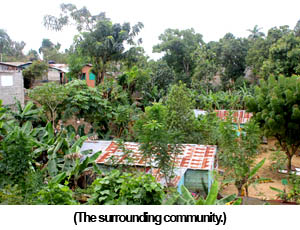 Anyway, Angel is a pastor, a father of three, and a mainstay at the school “Colegio Lubrera de Caballona” for the past three years with his team of dedicated teachers and administrators.
Anyway, Angel is a pastor, a father of three, and a mainstay at the school “Colegio Lubrera de Caballona” for the past three years with his team of dedicated teachers and administrators.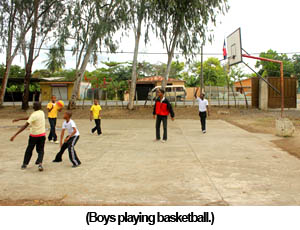 make a lot more money working at another school. Surely, there’d be better benefits, insurance, and opportunities for an annual salary raise. But “It’s worth it,” she tells me “because we have the ability to transform these children by helping them to learn, to grow, and to prepare them for the future.”
make a lot more money working at another school. Surely, there’d be better benefits, insurance, and opportunities for an annual salary raise. But “It’s worth it,” she tells me “because we have the ability to transform these children by helping them to learn, to grow, and to prepare them for the future.”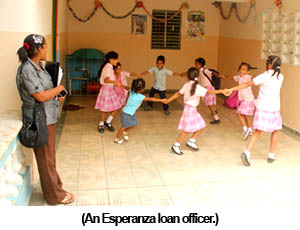 I’ve met a few of our Esperanza loan officers over the past year that have told me they’ve turned down better paying jobs because they feel called to be here, working in these communities, being a part of someone’s life, sharing from the Bible, assisting with someone’s transformation from economic poverty to self-sustainability and onto profitability. They ask me, “Where else would I have this opportunity?”
I’ve met a few of our Esperanza loan officers over the past year that have told me they’ve turned down better paying jobs because they feel called to be here, working in these communities, being a part of someone’s life, sharing from the Bible, assisting with someone’s transformation from economic poverty to self-sustainability and onto profitability. They ask me, “Where else would I have this opportunity?”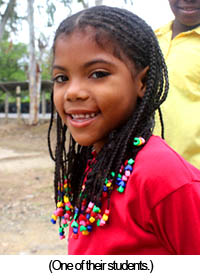 cups, a comfortable chair that adjusts, a nice laptop that was manufactured within the past two years, a bowl of fruit and plenty of natural light streaming in. Looking through the other glass pane, they see the opposite on every level, and it contains three more desks in the same space. Strangely, they choose the latter. Why?
cups, a comfortable chair that adjusts, a nice laptop that was manufactured within the past two years, a bowl of fruit and plenty of natural light streaming in. Looking through the other glass pane, they see the opposite on every level, and it contains three more desks in the same space. Strangely, they choose the latter. Why?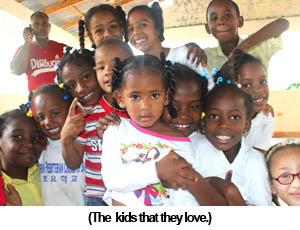 I’d like to think I’m getting more mature, and to that end I’d like to be very clear right now: this is not an opportunity for me nor for you to feel guilty. This is not a game of us and them tallying up our spiritual disciplines or accomplishments, nor of erasing our board completely. I simply want to say that we should all be inspired again by these verses:
I’d like to think I’m getting more mature, and to that end I’d like to be very clear right now: this is not an opportunity for me nor for you to feel guilty. This is not a game of us and them tallying up our spiritual disciplines or accomplishments, nor of erasing our board completely. I simply want to say that we should all be inspired again by these verses: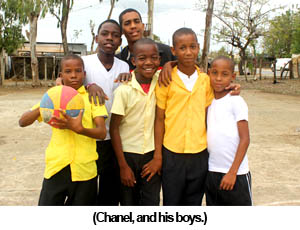 the two hands we’ve been given.
the two hands we’ve been given.